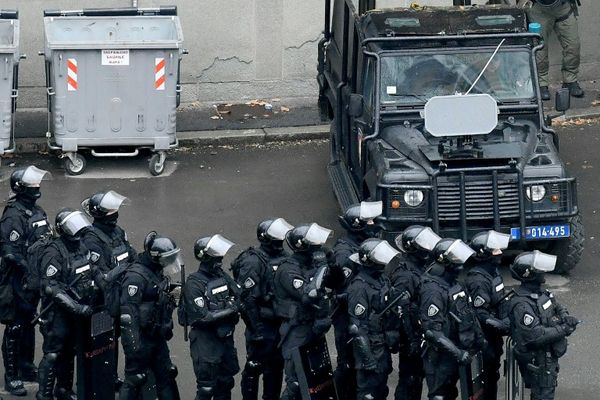A £3 million project exploring whether Stormont and CAFRE's Greenmount campus can be heated with geothermal energy, could tackle security of supply issues, decarbonisation and energy costs.
Department for Economy's permanent secretary, Mike Brennan, made the comment at the launch of milestone project, GeoEnergy NI, at Stormont Estate's Pavilion on Monday.
The DfE-led scheme follows three years groundwork and aims to ‘unearth the heat beneath our feet’ to support Northern Ireland's 2050 net zero target. The plans are expected to go before planners soon.
Read more: Stormont could soon be heated by geothermal energy
With some 56% of Northern Ireland's energy used for heating, those gathered learned about the possibilities of technologies first developed by the oil industry to tap into much more climate-friendly hot aquifers below the Earth's surface.
Those behind the project hope to drill five boreholes on Stormont Estate - four at a depth of 250m and one at 500m - to tap into an aquifer in sandstone beneath the surface in a shallow investigation to see how it could be used to heat buildings on the site.
At Greenmount, they will be going deeper as the target reservoir is 1km below the surface - so the drills will reach depths of between 1.5-2km. But before the work can get the go-ahead, environmental scoping exercises and a 3D model to re-risk the subsurface at Greenmount have to be carried out.
Permanent Secretary of the Department for the Economy, Mike Brennan, said: "In these times, without an Executive, it is important we send out the message that public sector services continue.
Mr Brennan said he would like to see the energy beneath our feet used to heat the "very large building at the top of this hill that contains a lot of hot air".
"This is a cutting edge initiative and certainly from DfE's perspective we are very happy to support delivery of this.
"We have a roadmap set out now in terms of an Energy Strategy and delivery of this sits very much in the centre of that. We have lots to do across the decarbonisation agenda, and we intend to move ahead as quickly as we can. Projects like this are critically important for a number of reasons. The obvious ones that come to mind are security of supply issues, the importance of decarbonisation and reducing costs."
DAERA's permanent secretary, Katrina Godfrey, said the project could help us "gain access to the sustainable energy sources we so badly need" to meet climate targets.
"For us this project is both exciting and timely and we are absolutely delighted to play our part. It's a really good example of how we can work together to find solutions that we are going to need for the future."
Geological Survey of NI director, Marie Cowan, said her scientists have been using their skills to help with Northern Ireland's energy transition. She added that she is delighted to see the option of geothermal come so far, saying: "This has to work."
GeoEnergy NI is being delivered by DfE with scientific support from the GSNI and specialist contractors led by Tetra Tech Europe.
Conor Lydon, Northern Ireland director of Tetra Tech Europe, said: "The project is three years in the making and we know we are standing on the shoulders of all the good work DfE and Geological Survey have put in over those years.
"We have planning support to allow us to make sure we are delivering the project safely and correctly.
"We very much want to showcase geothermal and try and try and demystify what geothermal is. We hope to inform the public, to provide a better understanding of the subsurface... to encourage further private investment and de-risk the geothermal sector.
"We hope the outcomes of this project inform the policy and regulatory framework, which currently isn't there yet."
We asked if there are any risks associated with the project and whether it will be zero carbon. Mr Lydon said: "The risks [at Stormont] are the need to drill carefully. We're drilling into the subsurface and interacting with groundwater and its a natural resource so we need to do that in a safe manner.
"There's a wide range of surveys being carried out including ecological surveys, archaeological surveys to try and better understand the sites before we do anything. We will have a appreciation of those risks and can mitigate those risks accordingly."
On the Greenmount site, he said the surveys "won't necessarily break ground... and won't necessarily to be too intrusive. In terms of environmental risk it's similar to what I described with Stormont... you will be carrying out ecological surveys to better understand species and other potentially impacted environments."
In relation to emissions, DfE's Ryan White said it will depend on whether the electricity used is from renewable sources.
Click here for more information.
For all the latest news, visit the Belfast Live homepage here and sign up to our daily newsletter here.







